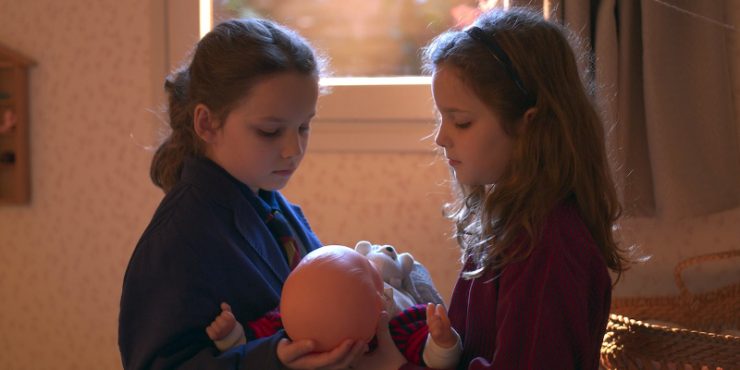As Petite Maman opens, the eight-year-old Nelly (Joséphine Sanz) politely says goodbye to several old women in a hospital, dutifully visiting each room and giving a fond but final “au revoir“. Saying goodbye is important to her, and even at her age, she recognizes its importance. In that same hospital, Nelly’s grandmother has just died. A goodbye forever. The event has thunderous emotional and psychological consequence, though it might not be fully obvious on the young girl’s face. How does a child experience grief? Céline Sciamma, one of our greatest living filmmakers, has decided to take up the challenge, visualizing the curiosity with which children view the world. Her film’s stars, Josephine and her twin sister Gabrielle Sanz, innocently lead a tale of intergenerational magical realism; a somber fairy tale about understanding the mercurial nature of our own parents’ emotions and how that informs us.
The stories of young people have often been Sciamma’s forte. Outside of her groundbreaking crossover smash, Portrait of a Lady on Fire, her films have all dealt with children or adolescents coming to an understanding about themselves or the world around them. Petite Maman is the first film to incorporate fantastical elements as Nelly discovers her mother, Marion (Nina Meurisse), in a way she’s never experienced before. Following her own mother’s death, Marion is understandably bereft. They go to the now empty home, discuss the furniture covered in white sheets and the wallpaper that recalls a time long past. Marion takes Nelly to her childhood bedroom, and tries to express to her daughter all the mysteries and curios that compelled her when she was Nelly’s age. When Nelly wakes up the next morning, Marion has disappeared and her father (Stéphane Varupenne), softly explains that they will continue to clear out the house by themselves.
Marion’s absence is not harped on. Nelly’s father never reverts to panic and his calmness trickles down to Nelly, who doesn’t worry but is obviously disrupted by her mother’s departure. Wandering the woods, she finds another young girl (Gabrielle Sanz) building a fort out of large branches in the same spot where Marion also made forts when she was a child. Nelly decides to help her and she reveals that her name is also Marion. The two girls are the same age and look remarkably alike. When it begins to rain, Marion takes Nelly back to her house to get dry. The house is identical to her late grandmother’s home, though it’s more thoroughly furnished and lived in. Nelly realizes: Marion is her mother as a young girl and she is somehow visiting her in the past. Initially frightened, Nelly eventually decides to keep visiting Marion, choosing to recapture time she’s lost with her mother and her grandmother (Margo Abascal).
At a brisk 72 minutes, Petite Maman does not waste a lot of time trying to explain its circular tale of time travel and familial reckoning. Exposition and backstory are sidestepped for a childlike point-of-view, we learn and grow as Nelly does. Sciamma and cinematographer Claire Mathon (is there a better director-DP team working today?) immaculately frame each image, pacing the story visually as Nelly evolves from a young girl lost in a world of complicated emotion to one who can glean the wisdom of her eight-year-old mother. The film’s story lacks more obvious conflict, instead focusing on Nelly and Marion’s quickly burgeoning friendship. The story is still tinged with melancholy – even at her age, Nelly understands that she cannot continue to live in both times at once. Sciamma’s decision to dwell on grace notes (Nelly helping her grandmother with a crossword clue or watching her father shave) instead of pushing tension makes Petite Maman the quiet wonder that it is; the drama of Nelly’s emotional journey is enough to make this film’s heart beat unlike any other.
The movie has had a long journey to the theaters; after a one-week qualifying run in November 2021, it did not come to theaters until just this weekend. Any Sciamma fans (*ahem* like myself), may have found the long wait unbearable. I can imagine how difficult it could be to market a quiet drama in a foreign language about a mother and daughter coming together as two little girls, but it’s still a shame that such a marvelous picture was the subject of such a herky-jerky release. That said, Petite Maman continues Sciamma’s unmatched skill for digging emotion from all that’s unsaid and crafting a narrative through the withdrawal of information. Like all children, Nelly worries that she may be the reason her mother is unhappy, and her visiting the young Marion (and her newly reincarnated grandmother) is a rage against the dying light of her own misunderstood grief. That Sciamma displays this with such beauty and affection is the reason why she’s such an indispensable filmmaker for our time.
Written and Directed by Céline Sciamma










